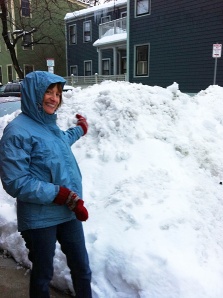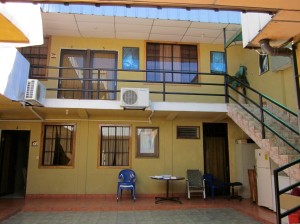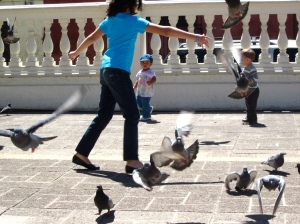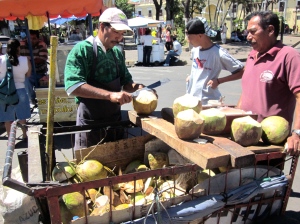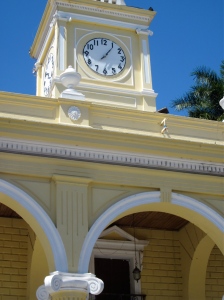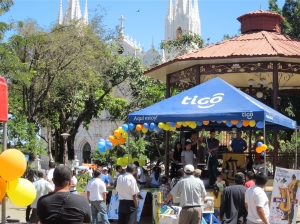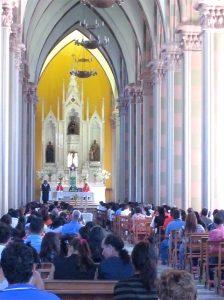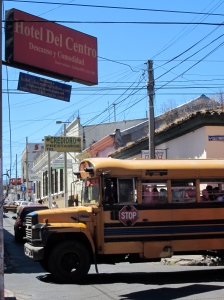Awoke to a beautiful morning with the temperature around 78. From what I’ve read the temperatures tend to be very consistent in El Salvador–90 degrees in the day and 70 degrees at night. What a welcome change from temperatures this past week in Boston–a high of 18 yesterday. Honestly, I am thrilled to be here during the month of February, rather than April as I initially planned. After what was one of the worst winters ever in Boston, there’s something wonderful about knowing that you’ll not have to check the weather for the next two weeks or worry that you’ll have another snow day (though I am very thankful that we had so many this year—I would not have been ready for my exchange).
Benjamin explained that when he traveled to the U.S. for his exchange two years ago that he found it strange that everyone was constantly checking the weather. He did, however, soon find out, after being caught unprepared in a downpour, why we Americans tend to be so obsessed with the weather.
After yesterday’s long day of travel and this morning’s yoga practice, I was eager for a leisurely shower. I quickly changed my plans after discovering that while my hotel room has a fine air conditioning system, it’s lacking in a hot water system. I’m not quite sure how I feel about this lack of hot water, as I admit that I love a steamy shower. I think that I will need to work on my showering technique over the next few days to insure maximum cleanliness in minimal time. I will admit that the closet style shower is a bit claustrophobic, so it’s probably better that I’ll be in and out as quickly as possible. I’m not sure it’s a good thing to think about scenes from Psycho or Prison Break while showering. How I wish that my son, Brad, had not commented prior to my trip, upon seeing images of my hotel, that it looks like “it was once a prison.” When I asked why, he explained in detail, noting, “I watch a lot of Prison Break, Mom. I know what prisons look like in Central America.” I guess I should be glad that this knowledge comes from viewing a television show, instead of firsthand experience.
After sliding on my flip-flops, my first outing in Santa Ana was to the historical center of the city. Benjamin took me to the Cathedral de Santa Ana. The courtyard to the church is a virtual menagerie of street vendors, selling everything from socks to coconut water, children, chasing the numerous pigeons, and beggars, seeking funds from those attending church. The church is a fairly imposing structure, serving as the focal point for the city’s town square. Visually, this set-up reminds me of when I taught in Amherst, New Hampshire. The village green of Amherst is hedged by a church, a town hall, a school, and a small store. The same is true in Santa Ana, though there is also a theatre and an extensive central market.
I am just beginning to understand the role that religion and faith play here in El Salvador. Benjamin explained that essentially those of the Catholic faith “run” the country, having access to good jobs and positions of status. If you’re “other” Christian (Evangelical, Baptist, etc.), then you’re also likely to secure a decent job and status–though these are guaranteed if you’re Catholic. I was quite surprised when Benjamin acknowledged that it is not uncommon to be asked one’s religion on job applications here in El Salvador. When he saw the look of surprise on my face, I explained to Benjamin that in the U.S. religion does not play a role when one is considered for a job. In fact, I said that “freedom of religion,” part of First Amendment, is intended to insure that individuals do not face discrimination, due to faith, in the workplace. Given that I’ll be teaching the Bill of Rights and Constitution upon my return to Boston, I can’t wait to share this conversation with my students. I think it will lead to some great conversations and debates.
Since it’s Sunday there was actually a service while we were at the cathedral. I was reminded of services I attended with my friend, Julie Baldwin, when I was little at Sacred Heart on Maple Avenue. I attempted, just once, to receive communion, thinking that “the body and blood of Christ” sounded like an interesting concept, only to have Father Manheart laugh and pat me on the head before moving onto Julie. Anyway, the cathedral in Santa Ana was packed. Benjamin explained that if you’re not in church on a Sunday morning and you’re out on the street, then it usually means that you’re up to no good. I soon found out what exactly he meant.
Having seen confessionals in the U.S. that are large box type structures that provide privacy for both the confessor and the priest, the confessionals in El Salvador were quite a surprise. Here, confessors kneel outside the confessional with the priest housed inside. Confessions were taking place during the service, so anyone in the congregation could see who was confessing. I know that they cannot hear the confession, but I’m not sure how I would feel about everyone seeing me confess. I can only imagine the thoughts running through everyone’s minds about the horrible deeds that I committed. Maybe it’s just my paranoia or my need for privacy, but I’m not sure that if I would be rushing to confession on a regular basis with this “public” set-up.
After leaving the center of Santa Ana, we waited for the bus to take us to Benjamin’s house. A bus ride cost $00.20 here in Santa Ana, significantly less than the $1.25-1.70 fares of the MBTA in Boston; however, the buses are basically “yellow” school buses.
I experienced what was to be the first of many “sales” pitches on this trip. As we were about to leave on our journey, two men, who appeared to be in their mid-twenties, climbed aboard and proceeded to handout plastic flowers (other typical “offerings” include pencils, candy, bookmarks). Once we were all provided with a flower, one of the men returned to the head of the bus while the other stayed in the back. Then, the man in the front began to speak in a very animated manner. Once again, given that I am sadly not a speaker of Spanish, I was unable to understand much of what he was saying. I will admit that my Latin came in handy, but still I couldn’t understand a great deal. Benjamin was kind enough to give me the general idea of his “sales pitch”: “Please accept this gift. Know that this is not a robbery, for we have changed our ways. We are not going to steal from you. We ask that you make a donation for the flower that you have in your hand. If you do not, please know that my friend and I can make your lives uncomfortable. We are simply asking for a donation.” So, we made our “donations,” keeping the flowers and avoiding possible harm.
During this ride I began to realize that the reports of violence and danger in El Salvador are not, unfortunately, exaggerated. My students who are from El Salvador warned me about the region, but I thought perhaps things had improved there in the past few years. Glancing down a side street during this ride, I saw yellow police tape and a mass of officers surrounding a body on the street. Benjamin’s response, “That’s how they do it now. It doesn’t matter if it’s Sunday morning or the middle of the day. If a gang wants to retaliate, it will seek justice when it wishes. He explained that the gang members used to stand out because of the way they dressed, the prominence of their tattoos, and the manner in which they walked, but they have changed their ways. Now, it is difficult to tell a gang member from any one else on the street. Once in a while there’s a swagger to the walk–old habits die hard– but often it’s impossible to tell.
I wondered how you get through each day having to constantly watch one’s back. I was already exhausted from thinking so carefully about every move I made–putting my camera away, not wearing jewelry, never taking the same path twice. Not three hours into my first day in El Salvador and seeing one murder victim made me more than a bit wary. Yet, Benjamin offered that it is for these reasons–the reality of the dangers and violence in El Salvador– that faith is so important. “If not for faith,” he conveyed, “you might not believe that it is possible to make it through the day. You need to have faith in God, for He will provide protection in even the most dangerous of situations.” Honestly, I’ve not thought a great deal about the relevance of faith in quite some time, but I found myself reflecting about the necessity of faith on this day.


